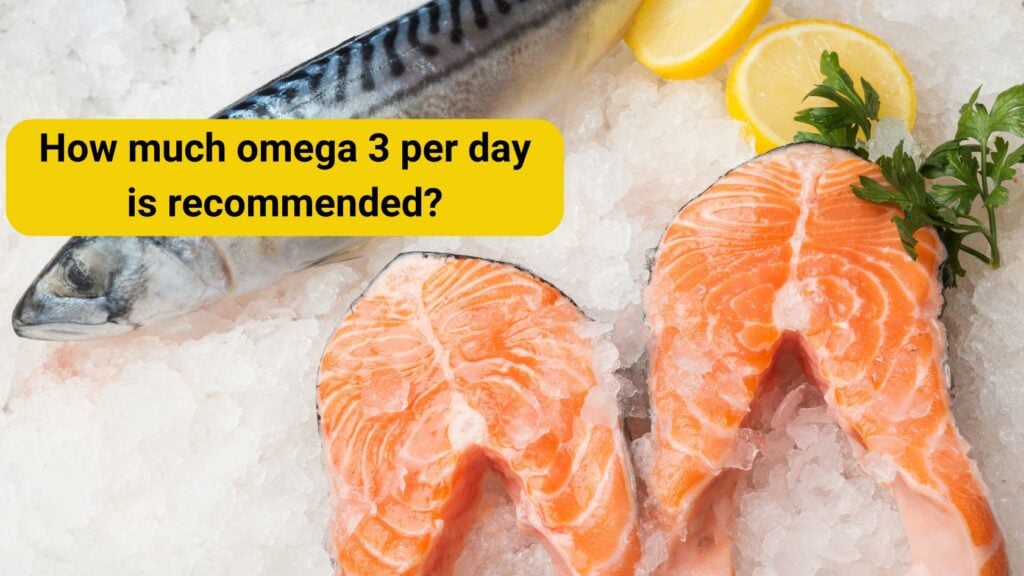How much Omega 3 do you need per day? Discover it here!
Omega 3 is an essential fatty acid that is vital for overall health. It plays a crucial role in the development and functioning of the brain, heart, eyes and immune system. It is important to know how much Omega 3 you need per day, because a deficiency of this fatty acid can lead to various health problems. In this article we will discuss how much Omega 3 children, dogs and adults need daily, which foods are rich in Omega 3 and how you can ensure you get enough.
What exactly is omega 3?
To answer the question of how much Omega-3 is necessary per day, we first explain what Omega-3 exactly is. Omega-3 consists of Omega 3 fatty acids. These form a group of essential unsaturated fatty acids that play an important role in a healthy diet.
Within this group there are three main types of omega-3 fatty acids:
- ALA: alpha-linolenic acid
- EPA: eicosapentaenoic acid
- DHA: docosahexaenoic acid
ALA is mainly found in certain plant products, while EPA and DHA occur in fish oil, among others.
How much Omega-3 do you need daily?
It is recommended for adults to consume a certain amount of Omega 3 daily. The exact recommended daily amount may vary depending on factors such as general health or age. However, it is generally recommended that adult men and women need 250mg to 500mg of EPA+DHA per day. Omega 3 is important for overall health in adults and can help reduce inflammation, improve heart health and support a healthy brain function.
| Age group | ALA (grams per day) | EPA + DHA (milligrams per day) |
|---|---|---|
| Adults (men) | 1,6 | 250-500 |
| Adults (women) | 1,1 | 250-500 |
| Children (1-3 years) | 0,7 | - |
| Children (4-8 years) | 0,9 | - |
| Children (9-13 years) | 1,2 | - |
| Teenagers (14-18 years) | 1,6 (boys) / 1,1 (girls) | - |
| Pregnant women | 1,4 | 300 |
| Lactating women | 1,3 | 300 |
The recommended amount for EPA and DHA is a range, as individual needs may vary.
Sources: Dietary guidelines from health organizations such as the World Health Organization (WHO), the Nutrition Center and the Health Council.
How much Omega 3 do you need for fitness or bodybuilding?
For athletes and people who are actively involved in fitness or bodybuilding, the need for Omega 3 may be higher than for the average person according to the magazine Nutrients published in 2018. Athletes may benefit from consuming approximately 2 to 3 grams of Omega 3 daily, including up to 1 gram of ADH and APA. Omega 3 may have several benefits for fitness and bodybuilding, including reducing inflammation after intense exercise, improving muscle building and promoting healthy joint function.
How do you ensure that you get enough Omega 3?
There are several ways you can ensure that you get enough Omega 3. One of the best ways is by including Omega 3-rich foods in your diet. For example, you can add oily fish to your meals or eat snacks with flax seeds or chia seeds. It's also important to vary your Omega 3 sources, as different foods contain different types of Omega 3.
You can supplement omega-3 with supplements
You can also consider taking Omega 3 supplements to supplement your diet. These supplements are available in different forms, such as fish oil, capsules or algae oil (capsules).
Fish oil supplements are a popular source of omega-3 fatty acids (EPA and DHA), but there are also supplements available that extract omega-3 fatty acids from algae, which is a good option for people who don't eat fish and also contains ALA. We compared the best and best-selling fish oil supplements, go to the research: Eqology fish oil compared to Arctic Blue
Nutrition with Omega-3
| Foodstuff per 100 grams | ALA (grams) | DHA (grams) | EPA (grams) |
|---|---|---|---|
| Linseed oil | 53,30 | - | - |
| Chia seed | 17,55 | - | - |
| Walnuts | 6,77 | - | - |
| Linseed, whole | 22,80 | - | - |
| salmon | 0,01 | 1,24 | 0,59 |
| Mackerel | 0,10 | 0,59 | 0,43 |
| Tuna, white, canned in water, drained | 0,02 | 0,33 | 0,05 |
| Haring | 0,06 | 0,94 | 0,77 |
| Sardines, canned in oil, drained | 0,01 | 0,74 | 0,45 |
| Rapeseed oil | 9,56 | - | - |
| Soya oil | 6,80 | - | - |
| Oysters | 0,11 | 0,23 | 0,30 |
| Lobster | 0,07 | 0,07 | 0,10 |
| Codfish | 0,01 | 0,10 | 0,04 |
| forel | 0,37 | 0,72 | 0,47 |
| Rapeseed oil | 9,56 | - | - |
| Soya oil | 6,80 | - | - |
What to look out for if you want to get omega-3 from your food such as fish
- The farmed fish are fed cheap food, while wild fish find their food in the wild. This can lead to differ in the levels of omega-3 fatty acids, such as DHA and EPA. In general, wild fish species have higher levels of omega-3 fatty acids than farmed fish.
- Farmed fish can even produce a have a higher environmental impact than wild fish, depending on factors such as the feed used, the degree of pollution and the use of antibiotics in the nurseries. Some farmed fish species are fed fishmeal and fish oil, which can contribute to overfishing and ecological disruption in the oceans. In addition, the dense populations in fish farms can lead to water pollution and the spread of diseases.
- Farmed fish may contain higher levels of contaminants, such as PCBs (polychlorinated biphenyls) and dioxins, than wild fish. This is because farmed fish are often exposed to contaminants in their environment, such as pesticides and antibiotics used in aquaculture.
These differences do not apply to all farmed fish species. Some farmed fish species can meet strict environmental standards and health regulations. Are you going for farmed fish? Then take organically farmed fish.
Differences between Omega 3 from food and supplements
There are some differences between getting Omega 3 from food and taking supplements. Consuming Omega 3-rich foods provides not only Omega 3, but also other nutrients important for overall health. On the other hand, supplements can be a useful option if you struggle to get enough Omega 3 from food. It is important to remember that supplements are not a substitute for a healthy diet and lifestyle.
Risks of an Omega 3 deficiency
A deficiency of Omega 3 can lead to various health problems. For example, it can lead to inflammation, reduced brain function, an increased risk of cardiovascular disease and poor eye health. It is therefore important to ensure that you get enough Omega 3 to reduce these risks. If you suspect that you have an Omega 3 deficiency, it is advisable to discuss this with your doctor.
Can you get too much Omega 3?
Although Omega 3 is important for health, it is also possible to get too much. Too much Omega 3 can lead to blood thinning, which can result in an increased risk of bleeding. It is recommended not to consume more than 3 grams of Omega 3 per day unless this is done under medical supervision. It is important not to exceed the recommended upper limit to avoid possible health problems.
Conclusion
Omega 3 is an essential fatty acid that is vital for overall health. It is important to know how much Omega 3 you need depending on your age, gender, health status and activity level. By including Omega 3-rich foods in your diet and taking supplements if necessary, you can ensure that you get enough Omega 3. It's also important to measure and track your Omega 3 intake regularly to ensure you're reaching the recommended amount. By being aware of your Omega 3 needs and ensuring you get enough, you can contribute to optimal health and well-being.
Questions and answers
How much Omega 3 do I need?
The recommended daily allowance of Omega 3 for adults is 250-500 milligrams of EPA and DHA per day. A lower dose applies to children.
What are the benefits of Omega 3?
Omega 3 has several health benefits, including lowering the risk of cardiovascular disease, improving brain function and reducing inflammation in the body.
What is Omega 3 in?
Omega 3 is mainly found in oily fish, such as salmon, mackerel and herring. There are also vegetable sources of Omega 3, such as linseed oil, chia seeds and walnuts.
Can I get too much Omega 3?
Yes, it is possible to get too much Omega 3. Too much Omega 3 can lead to bleeding and an increased risk of stroke. It is therefore important not to exceed the recommended daily amount.
Is it necessary to take Omega 3 supplements?
It is not necessarily necessary to take Omega 3 supplements if you get enough Omega 3 through your diet. However, if you don't get enough Omega 3, a supplement can be a good addition


